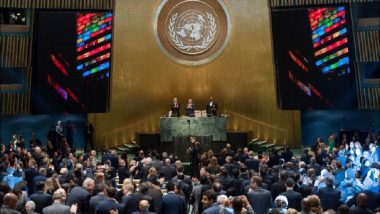Geneva, November 3: Aggrieved by the failure of the United Nations to adopt Comprehensive Convention on International Terrorism (CCIT), India on Saturday marked its dissent at the UN General Assembly convened in Geneva.
New Delhi's deputy permanent representative Tanmaya Lal also referred to Pakistan while marking his dissent, asserting that victims of terrorism in India are being targeted from "beyond the borders". UN Report on Kashmir Has No Mention of Pak-Sponsored Terrorism: EFSAS.
"Terrorism has emerged as one of the worst forms of violation of human rights... My country has had to face repeated terrorist attacks on innocent people, emanating from beyond our borders," the Indian envoy said.
Lal also expressed India's dismay at the large section of first world nations who have opposed the CCIT as it does not discriminates "between freedom fighters and terrorists".
"Despite terrorism being acknowledged as one of the foremost global challenges, any meaningful collective response to address this menace continues to be thwarted by some," he added.
Notably, the CCIT had been proposed by India before the UN nearly 22 years ago in 1996. A consensus could not be formed on the adoption of the treaty as critics claim that all non-state actors could not be categorised as terrorists.
Lal's address at the General Assembly also included a carefully-worded criticism of the Office of the High Commissioner for Human Rights, which recently tabled a report blaming the Indian forces of "committing excesses" in Jammu & Kashmir.
Claiming that such reports further deteriorate the credibility of the UN, the Indian envoy said the report on Kashmir is not reflective of the ground realities.
The report, he added, was "based on unverified sources of information", without adhering to the general mechanism of inquiry.
On human rights, the Indian deputy representative said his country is committed to uphold civil liberty, freedom and equality, as exhibited in the recent landmark verdict by the Supreme Court to decriminalise gay sex.
"India’s approach to human rights continues to evolve as more rights become justiciable and through the process of progressive interpretation of laws by the judiciary," he stated.
(The above story first appeared on LatestLY on Nov 03, 2018 09:00 PM IST. For more news and updates on politics, world, sports, entertainment and lifestyle, log on to our website latestly.com).













 Quickly
Quickly













 RCB
RCB







